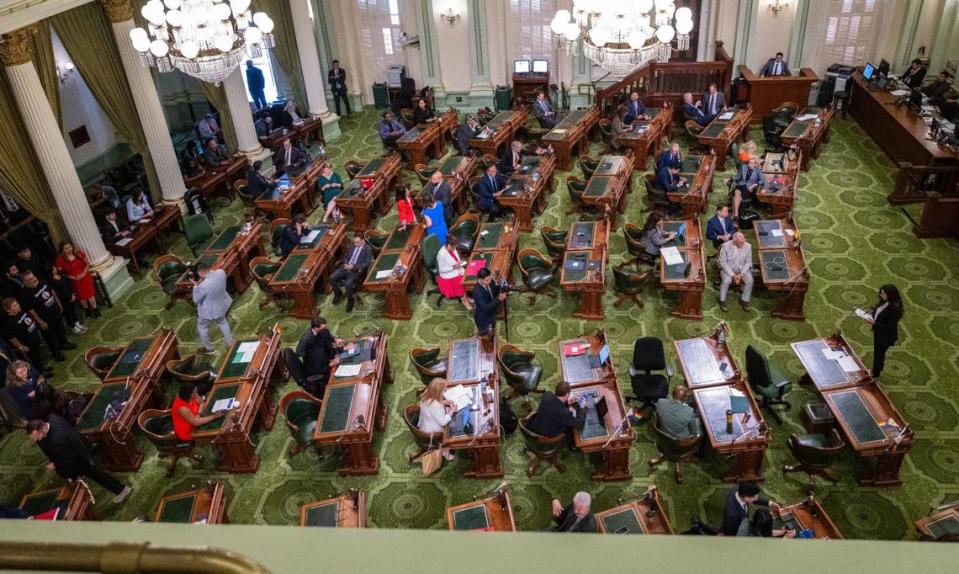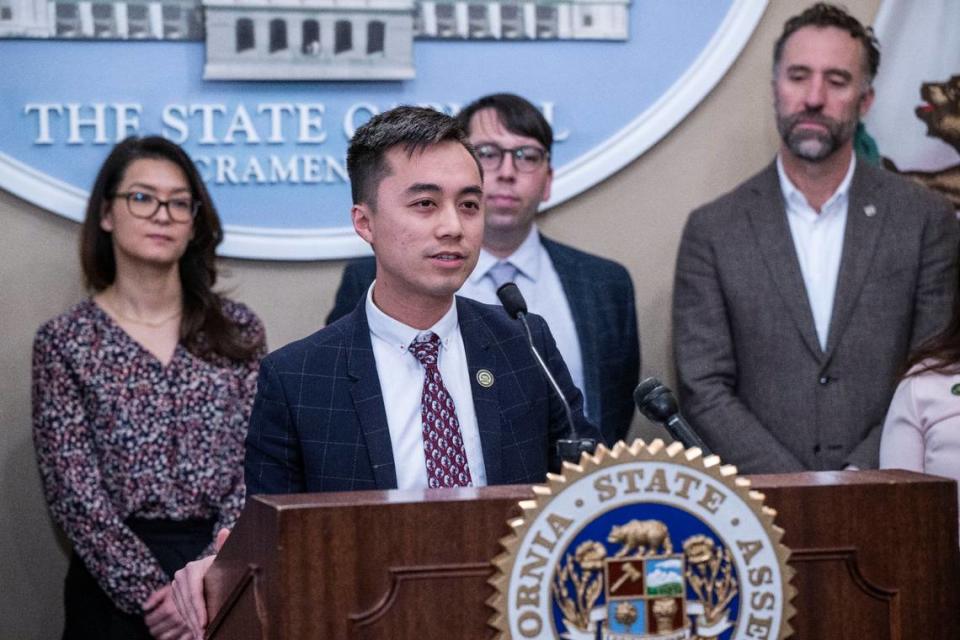California Democrats break from leaders’ push to repeal retail theft bills over Prop. 47 changes
Assembly Democrats are fracturing over California legislative leaders’ decision to make changes to some retail theft bills that are designed to derail a controversial November ballot initiative aimed at toughening laws against such crimes.
Some hardline progressive Democrats already disagreed with the legislation, but now moderates have joined them.
“I don’t support the amendments,” said Assemblywoman Cottie Petrie-Norris, a moderate Democrat from Irvine, on Thursday, a view echoed by some others in the party.
Law enforcement groups have been pressuring lawmakers to oppose the changes, although legislators have not directly attributed their concerns to the influence of outside groups. Petrie-Norris said she had gotten “outreach from our local law enforcement folks sharing their concerns.”
On June 8, Yolo County District Attorney Jeff Reisig posted on X, formerly known as Twitter, urging other officials to “contact your lawmakers and urge them to “OPPOSE” the ‘poison pill’ perversion.”
Last week, law enforcement officials joined Republicans to protest the change. Placer County District Attorney Morgan Gire called it “quite simply dirty.” He said it’s “placing politics over problem solving.”
“The bills are good, but they don’t go far enough,” Gire said. “They don’t go far enough in holding repeat thieves accountable. That’s what the initiative will do.”
The center-left’s reluctance could prevent Assembly Speaker Robert Rivas, D-Hollister, and Senate President Pro Tem Mike McGuire, D-Healdsburg, from passing the bills quickly. Fast approval would allow the measures to take effect as soon as Gov. Gavin Newsom signs them.
That kind of fast-track legislation requires a two-thirds vote in both the Senate and the Assembly, which could be tough to achieve if Democrats are not unified in their support.
Rivas and McGuire are using their considerable clout to push the package of 14 bills — seven from the Assembly and seven from the Senate. They recently-proposed changes to some of the bills would enact them immediately if Newsom signs them and the repeal the legislation if voters approve a November initiative.
Driving their effort is their opposition to the ballot measure that would change Proposition 47, a 2014 voter-approved initiative that reduced certain lower-level crimes to misdemeanors and set a $950 threshold for shoplifting.
The legislation package is similar to the ballot measure in many ways. A significant difference is a portion of the ballot initiative that would add penalties for someone convicted of shoplifting who has two or more previous theft-related convictions.
Democrats defect from amendments
Rivas has remained convinced the legislative strategy was sound.
On June 10, he said he was “confident in our approach, I’m confident in the bills that we have worked so hard to get right.”
But last week, the Assembly and Senate Public Safety committees did not add leadership’s changes.
Assembly Public Safety Chair Kevin McCarty, D-Sacramento, said he thought it would have been “inappropriate” to insert them. He said he “didn’t support them” and backs the bills in their current form, although he did not explain why.
On Monday, when the Senate Appropriations Committee added the changes to Assembly bills, chair Anna Caballero, D-Merced, announced McCarty had pulled the retail theft bill he authored. Assemblyman Marc Berman, D-Menlo Park, presented a bill from Assemblywoman Esmeralda Soria, D-Fresno, saying she had removed her name. Rivas will be taking it over, Berman said.
Soria told reporters later that day she took her name off the bill in response to law enforcement opposition to the changes.
The Sacramento Bee has reached out to Rivas’ office requesting a comment on McCarty and Soria’s actions.
To get enough votes to enact the bills right away, leaders would need to remove the addition voiding the legislation if voters approve the initiative, Petrie-Norris said on Thursday.
Tensions in the Legislature are “running really, really high around this issue,” Petrie-Norris said.
Progressives against increasing penalties
A handful of progressive Democrats have always been against a chunk of the retail theft bills, which they believe will disproportionately affect Californians of color and will not address the underlying issues that prompt people to commit crimes, such as poverty.
Five to six Assembly members from the Progressive Caucus did not support all of the retail theft legislation when the bills advanced from the Assembly floor. The caucus has at least 30 members in the Assembly, according to the house’s website. The Assembly Democratic Caucus currently has 62 members, according to its website.
Assemblyman Alex Lee, D-San Jose, said the Progressive Caucus does not have an official stance on the bill package, but “there is a lot of cause for concern amongst members.” Democrats greatly outnumber Republicans in the Assembly and Senate.
“We are concerned about responding to the politics of fear,” he said. “And going back to the tough-on-crime era. And so I think, for us, we wanted to really make sure that if we’re going to pass anything, they actually made sense and they weren’t just to appeal to the fear politics out there.”
Assemblyman Isaac Bryan, D-Los Angeles, declined to vote or voted ‘no’ on five of the seven Assembly bills. Lee declined to vote or voted against four of the bills.
Two bills received the least amount of support from progressives. A handful did not vote on Assembly Bill 3209 from Berman, which would allow restraining orders against people convicted of retail theft, vandalism or other battery offenses.
Five Democrats voted against Assembly Bill 1960, the bill Soria previously authored, which would add sentencing enhancements for people who destroy property while committing a felony if the loss is more than $50,000.
Bryan said he understands the need for the Legislature to respond to “step into this space to avoid kind of greater harm” from the ballot measure. But, he said, “if the choice is significant harm or less harm, from my vantage point, I choose neither.”
“I think there’s an opportunity to do good,” Bryan said. “And to recenter this conversation about people and about struggle and about the conditions that create the kind of economic insecurity and anxiety that results in symptoms like petty theft.”



